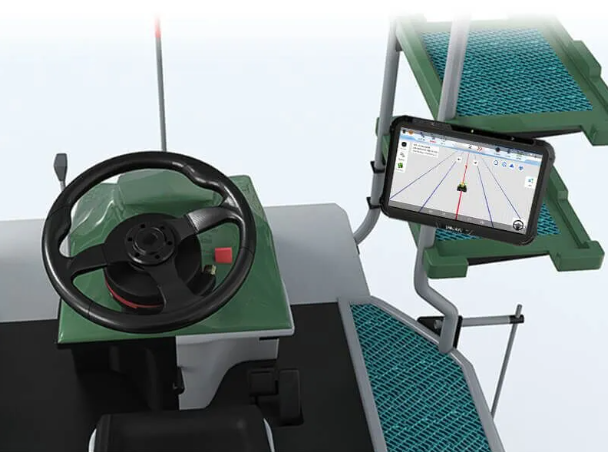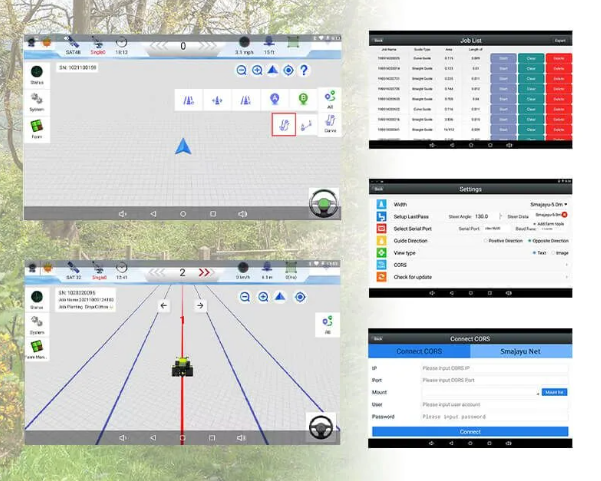Uncover the agricultural revolution powered by RTK GPS receiver, enhancing efficiency and productivity. Explore their seamless integration with farming equipment and the robust support provided by manufacturers such as SMAJAYU.
Unlocking Agricultural Potential: The Role of RTK GPS Receivers
1.1 Addressing Agricultural Challenges
Agriculture, the backbone of civilization, faces a multitude of challenges in the modern era. From variable soil compositions to the intricacies of input management and the perennial issue of labor constraints, farmers encounter hurdles that impede productivity, profitability, and sustainability. These challenges are not merely impediments; they shape the landscape of agricultural operations, influencing decision-making and resource allocation at every turn.
1.2 The Impact of Agricultural Challenges
In the realm of farm management, these challenges manifest in various ways. Soil variability, for instance, complicates the uniform application of resources, leading to inefficiencies and suboptimal yields. Input management becomes a delicate balancing act, where the misuse or overuse of fertilizers, pesticides, and water can have detrimental effects on both the environment and the bottom line. Moreover, labor constraints exacerbate these issues, as the shrinking agricultural workforce struggles to meet the demands of modern farming practices.
Understanding the intricate tapestry of soil composition is essential for successful agricultural practices. However, the variability inherent in soil types across fields poses a significant challenge for farmers. RTK GPS technology offers a solution by providing precise positioning and guidance, allowing farmers to navigate the terrain with unparalleled accuracy. By mapping soil variations and adjusting operations accordingly, farmers can optimize resource utilization and minimize waste.
1.4 Input Management: Balancing Act
Effective input management is crucial for maximizing farm productivity while minimizing environmental impact. RTK GPS receivers play a pivotal role in this endeavor by enabling variable rate application techniques. By precisely tailoring inputs such as fertilizers and pesticides to match the specific needs of different areas within a field, farmers can optimize yields while reducing costs and minimizing environmental harm.
1.5 Labor Constraints: Automating Operations
As labor shortages continue to plague the agricultural sector, the need for automation becomes increasingly pressing. RTK GPS receivers, coupled with advanced machinery, offer a solution by automating various field operations. From planting and spraying to harvesting, these technologies streamline processes, alleviating the burden on labor-strapped farms and increasing operational efficiency.
Precision Agriculture Redefined with RTK GPS Receivers
2.1 Empowering Precision Agriculture
In the quest for agricultural optimization, precision is paramount. RTK GPS receivers serve as the cornerstone of precision agriculture, revolutionizing traditional farming practices with their unparalleled accuracy and reliability. By harnessing the power of precise positioning, farmers can unlock new levels of efficiency and productivity, ushering in a new era of sustainable agriculture.
2.2 Variable Rate Application: Optimizing Inputs
Gone are the days of blanket applications; variable rate application (VRA) is the new norm in precision agriculture. RTK GPS receivers enable farmers to apply inputs such as fertilizers, pesticides, and irrigation water at varying rates based on the specific needs of different areas within a field. This targeted approach not only maximizes resource efficiency but also minimizes environmental impact, making agriculture more sustainable for future generations.

2.3 Accurate Planting: Setting the Stage for Success
Planting is the foundation of a successful crop cycle, and precision is key to ensuring optimal yields. RTK GPS receivers provide farmers with precise positioning and guidance, allowing for accurate seed placement with minimal overlap or skips. This not only maximizes seed-to-soil contact but also ensures uniform emergence, setting the stage for a bountiful harvest.
2.4 Targeted Irrigation: Watering Wisely
Water, the elixir of life for crops, must be managed judiciously to avoid waste and ensure maximum efficacy. RTK GPS receivers enable farmers to precisely map soil moisture levels and apply irrigation water only where and when it's needed. By minimizing water usage and reducing runoff, farmers can conserve this precious resource while maximizing crop yields.
Revolutionizing Farm Operations: The Power of RTK GPS Receivers
3.1 Enhancing Efficiency and Productivity
In the fast-paced world of modern agriculture, efficiency is paramount. RTK GPS receivers stand at the forefront of technology, revolutionizing farm operations and maximizing efficiency like never before. By providing precise positioning and guidance, these receivers streamline field tasks, reduce overlaps, and minimize downtime, ultimately translating into higher productivity and profitability for agricultural businesses.
3.2 Streamlining Farm Operations
Gone are the days of manual navigation and guesswork in the fields. RTK GPS receivers bring precision to every aspect of farm operations, from tillage to harvesting. By eliminating the need for manual steering, these receivers reduce operator fatigue and ensure consistent, straight passes, leading to more uniform crop distribution and optimized resource usage.
3.3 Time-saving Benefits of Autosteering Systems
Autosteering systems, powered by RTK GPS technology, represent a significant leap forward in farm automation. These systems automate steering tasks, allowing operators to focus on other critical aspects of field operations. Whether it's planting rows of crops, spraying pesticides, or harvesting grain, autosteering systems save valuable time and increase operational efficiency, ultimately boosting overall productivity.
3.4 Higher Productivity, Greater Profitability
In agriculture, time is money, and every minute saved translates into increased profitability. By maximizing efficiency with RTK GPS receivers and autosteering systems, farmers can accomplish more in less time, leading to higher yields and greater financial returns. Additionally, reduced overlaps and optimized resource usage result in lower input costs, further enhancing profitability for agricultural businesses.
Seamless Integration with Farming Equipment: The Versatility of RTK GPS Receivers
4.1 Compatibility Across Equipment
One of the key advantages of RTK GPS receivers is their compatibility with a wide range of farming equipment. Whether it's tractors, implements, or drones, these receivers seamlessly integrate with various machinery, regardless of brand or model. This versatility allows farmers to leverage their existing equipment investments while harnessing the power of precision agriculture.
4.2 Ease of Integration and Retrofitting
Integration of RTK GPS systems onto existing machinery is a straightforward process, thanks to standardized interfaces and plug-and-play compatibility. Farmers can retrofit their tractors and implements with RTK GPS receivers with minimal hassle, maximizing the return on their investment without the need for costly equipment upgrades. This flexibility ensures that farmers of all sizes and budgets can benefit from precision agriculture technologies.
4.3 Addressing Diverse Farming Needs
From large-scale row crop operations to specialty crops and vineyards, RTK GPS technology caters to the diverse needs of different farming operations and cropping systems. Whether it's navigating narrow rows, contour farming on hilly terrain, or precise orchard management, RTK GPS receivers provide the accuracy and reliability needed to optimize farm productivity across various agricultural contexts.

Empowering Farmers with Comprehensive Support and Training
5.1 Importance of Support and Training
While RTK GPS technology offers transformative benefits for agriculture, successful implementation relies on comprehensive support and training. Manufacturers like SMAJAYU recognize the importance of empowering farmers with the knowledge and resources needed to harness the full potential of RTK GPS receivers. From technical assistance to software updates and on-site training, robust support services ensure a smooth transition to precision agriculture.
5.2 Technical Assistance and Software Updates
Manufacturers and dealers of RTK GPS receivers provide ongoing technical assistance to farmers, helping troubleshoot issues and optimize system performance. Regular software updates ensure that farmers have access to the latest features and improvements, keeping their equipment up-to-date and maximizing its longevity. This proactive approach to support ensures that farmers can rely on their RTK GPS receivers for years to come.
5.3 On-site Training and Education
Understanding the intricacies of RTK GPS technology is essential for its successful implementation on the farm. Manufacturers and dealers offer on-site training and education programs to familiarize farmers with the capabilities and operation of RTK GPS receivers. These training sessions cover everything from system setup and calibration to advanced features and troubleshooting, empowering farmers to make the most of their investment in precision agriculture.
5.4 Overcoming Implementation Challenges
Transitioning to RTK GPS technology may present challenges for some farmers, especially those new to precision agriculture. However, with comprehensive support and training, farmers can overcome these challenges and unlock the full potential of RTK GPS receivers. By providing ongoing assistance and guidance, manufacturers and dealers ensure that farmers can navigate the transition with confidence and achieve success in their precision agriculture endeavors.
Conclusion: Paving the Way Forward
As agriculture grapples with an ever-evolving landscape of challenges, the need for innovative solutions has never been greater. RTK GPS technology, with its ability to provide precise positioning and guidance, offers a beacon of hope for farmers seeking to overcome obstacles and optimize their operations. From variable rate application to accurate planting and targeted irrigation, the possibilities are limitless with RTK GPS receivers at the helm. As we look to the future of agriculture, one thing is certain: the path to sustainable farming begins with precision.


